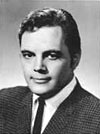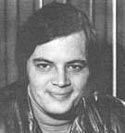Mr. Bee, Daryl B ( Daryl Burlingham )

The first time I met Daryl Burlingham was in an elevator.
I was a copyboy at the Winnipeg Free Press; he was a disc jockey at CKRC, in the same building. I don�t know if newspapers have copyboys anymore, now that everything is digital, but back then copyboys were journalist apprentices, newspapers indentured serfs. We ran. We ran when one of the editors yelled Copy! and ran it to composing; ran for coffee for the reporters and editors; ran when the teletype machines rang; ran down to the presses to bring up the first edition; we pretty much ran all day. I was running, bringing up forty or fifty papers or forty or fifty coffees (I don't remember which) when the doors of the elevator opened and the great Daryl B stepped in looking cool, well dressed in a blazer and slacks, shined shoes, giving me that smile he had that said, I guess you'd rather be me.
The doors opened and he stepped off into the air-conditioned CKRC offices. Through the plate glass of the studio, I could see a disc jockey wave at him while he put another record on a turntable. The doors closed leaving me hot and sweaty and with a day's more running to do. I think that's the moment I decided to get into radio.

The next time I met Daryl B he was working the afternoon shift at CKLG. It was 1969. The advertising agency I worked with had devised a campaign for CKLG that promoted the Boss Jocks as flower children, a very successful campaign as it turned out that stole liberally from The Beatles movies and The Monkeys television series, and because I was the youngest employee on the creative team, I got to pitch it. Therefore everyone assumed it was my concept. Why would I correct that impression? It went well and a couple of months later LG invited me to join them as a kind of creative director.
That's when I discovered who the guy behind the Daryl B smile really was. In terms of the social hierarchy of the station, if this were the Rat Pack, then Roy Hennessey assumed the Frank Sinatra leadership role and Burlingham the Dean Martin character. But in terms of the CKLG sound, it was all Burlingham. He was the guy with the cohunes. He was one all the other jocks emulated in on-air slam and off-air swagger. He set the tone.
When you listen to a station long and lovingly enough, you will find the one voice that embodies its sound, its soul, its character. That voice was B: big, brash, baritone and format-tight. He didn't sound excited on-air, he made it sound exciting listening to hits, being plugged tight to the centre of the universe, and most of it merely consisted of giving a time check.

It was B the station sent to Los Angeles to tape and deconstruct the sound of the then mighty rocker, KJR, the format LG ripped off and rocked with. For a while, LG was king of the hill, even bettering the impregnable CKNW in a rating period, unheard of at the time. At the top of his game, Daryl B became legendary among rock jocks not only in Canada but later in the U.S. when he joined Bill Drake's pirates in Windsor at CKLW, the station that rocked Detroit.
When I knew him Daryl B and many of the Boss Jocks were usually surrounded by beautiful young women. B preferred bosomy beautiful young women and he presented them with an apparently indefensible persona sort of a wounded artist hidden by a hard-shelled exterior, part Lord Byron, part Clint Eastwood. I had observed the sensitivity myself on occasion, particularly when B and I worked together on a radio project that meant something to him. We did a lot of special programming in those days and B was prepared to stretch himself reading poetry, novel excerpts, and material written specifically for his broadcast personality and he worked hard to get it right. I remember a special Peace Program we taped together. We listened to it on Christmas Eve with the ladies who were in our lives at the time. I don't think the ladies were sure why all of this was so important but to B and me, who hung on every spoken word and every sweet lyric, this was what radio was about word pictures, mood creation, ideas and imagination. I was with a man who grew up on radio as a boy on the prairies listening to those far-off stations in Chicago and Kansas City and, later as a young announcer, when the night air was right, learning from the Wolfman who raged from the 250,000 watt monster, XERF across the Mexican border.
Burlingham became a radio star at CKY. He hosted Battle of the Bands, a huge live event in Winnipeg, where he met and became a life-long friend of another wild man, Burton Cummings of The Guess Who. You'd have to find someone who knew B better to get those stories but certainly Burton and B were dangerous when they were together. The Battle of the Bands is also where he met a young drummer, Rick Honey, the future Boss Jock who was to play such a critical supporting role in B's life.
It was on Daryl's recommendation that his discovery, Honey, then working in radio in Sydney, Nova Scotia, was flown into Vancouver for an audition. Honey became a very popular personality at CKLG, and later for decades on CKNW, and he always held an affinity for his former mentor. Later in life when Burlingham struggled with addiction and a recurrence of his childhood polio, it was Honey who befriended him. Privately, without fanfare, Honey helped financially support Burlingham in a private care residence.
Honey himself succumbed to cancer at an early age and was nothing short of heroic in his final days. Perhaps it was fate, perhaps it was grief but three days after Rick Honey died in North Vancouver, Daryl Burlingham died in Saskatoon.
Honey's memorial service packed Christ Church Cathedral in downtown Vancouver. Burlingham's passing went virtually unacknowledged. So I ask you, when someone is great at something, for a while possibly the best at something, whether it be teaching math or rocking on the radio, shouldn't their talent be recognized? Personally I think it's about time for the great Daryl B's long awaited wake.
By Myles Murchison